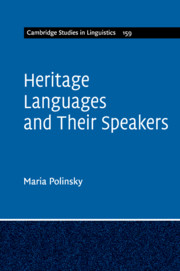Book contents
- Heritage Languages and Their Speakers
- Cambridge Studies in Linguistics
- Heritage Languages and Their Speakers
- Copyright page
- Dedication
- Contents
- Preface
- Acknowledgments
- Abbreviations
- 1 Who Are These Speakers, Where Do They Come From, and How Did They Get to Be the Way They Are?
- 2 Heritage English
- 3 How to Study Heritage Speakers
- 4 Phonetics and Phonology
- 5 Morphology and Morphosyntax
- 6 Syntax
- 7 Semantics and Pragmatics
- 8 Heritage Languages and Their Speakers in Unexpected Places
- Conclusions
- References
- General Index
- Language Index
4 - Phonetics and Phonology
Published online by Cambridge University Press: 20 July 2018
- Heritage Languages and Their Speakers
- Cambridge Studies in Linguistics
- Heritage Languages and Their Speakers
- Copyright page
- Dedication
- Contents
- Preface
- Acknowledgments
- Abbreviations
- 1 Who Are These Speakers, Where Do They Come From, and How Did They Get to Be the Way They Are?
- 2 Heritage English
- 3 How to Study Heritage Speakers
- 4 Phonetics and Phonology
- 5 Morphology and Morphosyntax
- 6 Syntax
- 7 Semantics and Pragmatics
- 8 Heritage Languages and Their Speakers in Unexpected Places
- Conclusions
- References
- General Index
- Language Index
Summary
- Type
- Chapter
- Information
- Heritage Languages and their Speakers , pp. 114 - 163Publisher: Cambridge University PressPrint publication year: 2018

